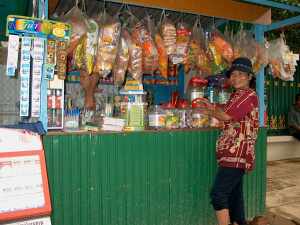|
|
|||
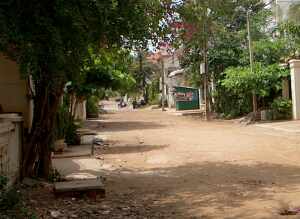
|
A little green shop appeared suddenly on our street a couple weeks ago. Actually it's more like a little green shed set up in front of one the houses at the other end of Street 306 where we have our Maryknoll center house and office and where five of us Maryknollers live. It's almost the first and only sign of commerical activity on our stretch of the street which is quiet and not so busy, probably partly due to the lack of paving and the big potholes. At one point a disabled people's organization tried to set up a restaurant and handicraft shop in a big house near the new little shop, but the lack of traffic on our street ultimately caused that group to move out to another part of town. Now our new shopkeepers sell mobile phone cell cards, cigarettes, candies, instant noodles, and snack foods, in addition to serving lunch in the front yard for nearby motorcycle taxi drivers waiting for fares. |
|
17 November 2002
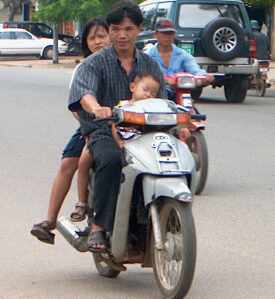 A joke making the rounds in Phnom Penh asks "How many people can you fit on a motorcycle?" The answer: "How many people are in your family?" Here a family of four fits very comfortably on a typical motorbike. (Note the leg of the little girl between mom and dad.) Safety is not a concern, or, if it is, not something that the average person can do much about, so dad drives along with one hand while holding his sleeping son in front of him. This picture is a little unusual in that mom is straddling the bike rather than riding sidesaddle as is more common for women. The daughter may be just big enough that mom doesn't have enough room for that style of riding.
A joke making the rounds in Phnom Penh asks "How many people can you fit on a motorcycle?" The answer: "How many people are in your family?" Here a family of four fits very comfortably on a typical motorbike. (Note the leg of the little girl between mom and dad.) Safety is not a concern, or, if it is, not something that the average person can do much about, so dad drives along with one hand while holding his sleeping son in front of him. This picture is a little unusual in that mom is straddling the bike rather than riding sidesaddle as is more common for women. The daughter may be just big enough that mom doesn't have enough room for that style of riding.
4 November 2002
 Cambodians don't have much money but they have a certain sense of dignity shown in their haircuts. Seldom do you see long-haired men around town. There are the occasional teenagers making their sartorial point of rebellion, but generally men and women keep their hair neat and tidy--and the men keep it short. Here a father brings two sons to the curbside barber near the royal palace to reinforce for them the Khmer sense of propriety. His daughter just came along for the ride on the family motorbike. A haircut on the street like this costs 2000 riel (approximately 50 cents) for adults and for the children probably 1000 or 1500 riel.
Cambodians don't have much money but they have a certain sense of dignity shown in their haircuts. Seldom do you see long-haired men around town. There are the occasional teenagers making their sartorial point of rebellion, but generally men and women keep their hair neat and tidy--and the men keep it short. Here a father brings two sons to the curbside barber near the royal palace to reinforce for them the Khmer sense of propriety. His daughter just came along for the ride on the family motorbike. A haircut on the street like this costs 2000 riel (approximately 50 cents) for adults and for the children probably 1000 or 1500 riel.
3 November 2002
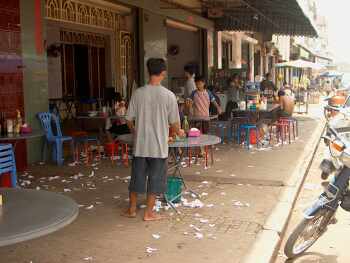 One of the customs here in Cambodia is to throw all trash on the floor of restaurants. The restaurants usually offer rolls of toilet paper for napkins or else take regular paper napkins and cut each one into eight or sixteen smaller (and useless) sections. Then after use, the napkins of whatever origin or size are thrown onto the floor. Some of the staff will dutifully sweep them up throughout the day, even sweeping up the dusty dirt floors of outdoor eating spots. It seems to me that everyone would benefit--and the restaurant would look much nicer--if the used napkins were just put into wastepaper baskets, but that's not how they do it here. (Notice the green rubbish bin under the table, surrounded by discarded napkins.)
One of the customs here in Cambodia is to throw all trash on the floor of restaurants. The restaurants usually offer rolls of toilet paper for napkins or else take regular paper napkins and cut each one into eight or sixteen smaller (and useless) sections. Then after use, the napkins of whatever origin or size are thrown onto the floor. Some of the staff will dutifully sweep them up throughout the day, even sweeping up the dusty dirt floors of outdoor eating spots. It seems to me that everyone would benefit--and the restaurant would look much nicer--if the used napkins were just put into wastepaper baskets, but that's not how they do it here. (Notice the green rubbish bin under the table, surrounded by discarded napkins.)
Anyone for a Sparrow Snack? A frequent site in Phnom Penh is the sparrow vendor, a man with a cage full of live sparrows for sale. A favorite afternoon snack for Cambodians is a couple roasted sparrows and a cold beer. The sparrows are so popular, however, that the demand has depleted the local sparrow population which has led to an increase in the bugs and other critters that the birds normally eat. I've always wondered how the birds are prepared. Seems like an awful lot of work for very little food!
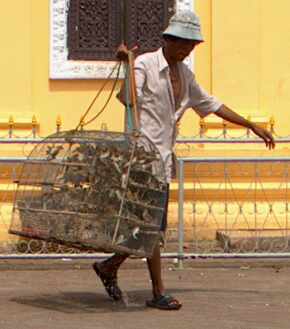 2 November 2002
2 November 2002
29 October 2002
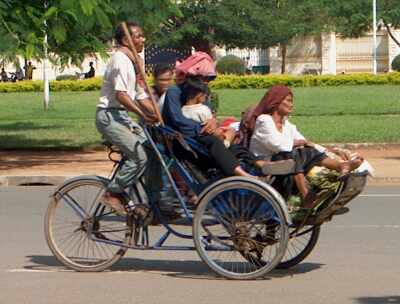 Grandmother, mother, son, and a lot of stuff ride in a cyclo near the Phnom Penh waterfront. Cyclos are very much a part of the Cambodian traffic scene, attracting as drivers the poorest of the poor who migrate from the villages to the city looking for work. The cyclo drivers rent the three-wheelers and usually sleep in them at night after a hard day pedaling loads like the one shown here. And this is an easy load. It's on one of the few paved streets in Phnom Penh. The extra head in the background is a motorcyclist behind the cyclo.
Grandmother, mother, son, and a lot of stuff ride in a cyclo near the Phnom Penh waterfront. Cyclos are very much a part of the Cambodian traffic scene, attracting as drivers the poorest of the poor who migrate from the villages to the city looking for work. The cyclo drivers rent the three-wheelers and usually sleep in them at night after a hard day pedaling loads like the one shown here. And this is an easy load. It's on one of the few paved streets in Phnom Penh. The extra head in the background is a motorcyclist behind the cyclo.
27 October 2002
Cooking with Wood
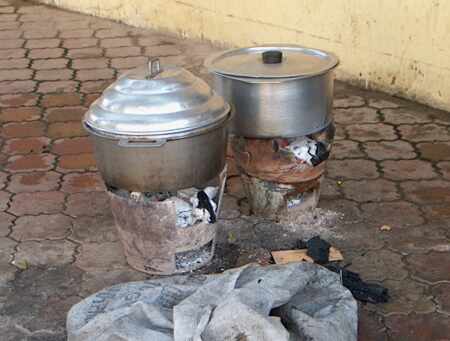
Most of Cambodia cooks with wood, burning kindling and small pieces of charcoal in large pottery burners like the two pictured here. Even in the city, at meal times the burners are set outside many of the homes or under a small shed roof in the back. Vendors drive motorbikes towing wagons of charcoal through the city, usually with the wife and a scale sitting on top of the black heap. A middle-class minority might be able to cook with gas connected to a circular burner ring the right size for holding a wok.
16 October 2002
Dangerous Roads In the early 1990s, Cambodia had only a handful of shared taxis and the UN/NGO/military vehicles. Ten years later, 25,000 four-wheel vehicles were registered in the country. The state of peace and increased prosperity has also contributed to the road volume, and Handicap International Belgium noted a 57% increase in traffic at major Phnom Penh intersections between 2000 and 2001.
Road accidents are now the leading cause of death in Cambodia, surpassing landmine and UXO (Unexploded Ordnance) fatalities since 1999. Much of the increase in reported road-accident casualties can be attributed to better record keeping on the part of authorities, but probably most of the upturn is due to faster road conditions and the increase in the number of vehicles on the country's roads.
14 September 2002 More than bumps in these roads!
There is very little maintenance of roads in Phnom Penh. In the picture here, a sewer cover on a dirt road near the Maryknoll office has collapsed and has presented an open hole to oncoming traffic for a year or more now. No repair can be expected so the local people have stuck an old wooden pole in the gaping hole to alert the road traffic of the peril before them. Such open holes are an especially danger in the rainy season when the roads are flooded and the open sewers cannot be seen by people wading through the waters.
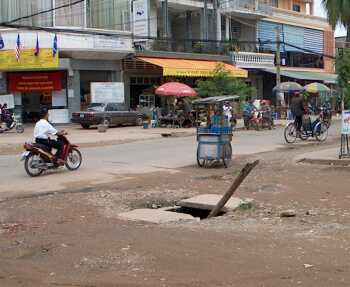 Only a very small percentage of the roads and streets in Phnom Penh are paved. And paving is a relative factor. Sometimes the paved roads have just as much flooding, just as many potholes and other obstacles as the unpaved streets. That's not all bad. It keeps the traffic moving more slowly, and in a country where there is no observance of traffic laws, that's a plus. Many more would die in Phnom Penh traffic if higher speeds were possible.
Only a very small percentage of the roads and streets in Phnom Penh are paved. And paving is a relative factor. Sometimes the paved roads have just as much flooding, just as many potholes and other obstacles as the unpaved streets. That's not all bad. It keeps the traffic moving more slowly, and in a country where there is no observance of traffic laws, that's a plus. Many more would die in Phnom Penh traffic if higher speeds were possible.
7 July 2002
Broadband in Phnom Penh
 -- I almost hate to write about this, but last week we had a broadband Internet connection installed in the Maryknoll office here in Phnom Penh! Broadband always seems like a luxury to me, and up to now it would have been unthinkable here in poverty-stricken Cambodia. But when we started comparing costs, we found that a broadband connection would cost us about 50% or 60% of what we were paying our ISP for a dial-up connection. It is only a 64 kb connection so the speed won't be that much greater but our experience so far is that the signal is more consistent, without the slowdowns of the telephone line. The broadband connection is via microwave so we had to have a small dish antenna installed on the roof. In the picture, a technician is installing networking cable in my room because with the one Internet connection coming into the house, we had to network all the computers to give them all access to the Net.
-- I almost hate to write about this, but last week we had a broadband Internet connection installed in the Maryknoll office here in Phnom Penh! Broadband always seems like a luxury to me, and up to now it would have been unthinkable here in poverty-stricken Cambodia. But when we started comparing costs, we found that a broadband connection would cost us about 50% or 60% of what we were paying our ISP for a dial-up connection. It is only a 64 kb connection so the speed won't be that much greater but our experience so far is that the signal is more consistent, without the slowdowns of the telephone line. The broadband connection is via microwave so we had to have a small dish antenna installed on the roof. In the picture, a technician is installing networking cable in my room because with the one Internet connection coming into the house, we had to network all the computers to give them all access to the Net.
19 June 2002 The Streets Still Flood
The last five or six months of the dry season which just ended, the foreign residents in Phnom Penh all were commenting on the city's efforts to repair the sewer system. Teams of men, dressed only in undershorts and flipflops would go down into the 18"-wide sewers and bring out bucket after bucket of black muck. The question then was how much their work would improve the drainage of water when the rains came. The answer, now that the rains have come, is "not much." Twelve hours after a heavy downpour last Sunday evening, I was on the back of a motordupe on Sihanouk Street, one of the main arteries of the city and we encountered several blocks of the worst flooding I have ever seen on the city streets here. Maybe it was not as bad as it was in the past--it's hard to estimate what might NOT have happened because of the drainage work--but it seemed to me like the flooding was worse now than before.
16 April 2002
 Back in the 1960s, Phnom Penh had ten or eleven movie theaters and a thriving movie industry. The king himself is an ardent movie buff, and in those days both produced and starred in a number of feature-length films, often stories with a strong propaganda element in them. All of that disappeared during the Khmer Rouge time, though, and Phnom Penh did not even have one theater for the past decade until one reopened late last year. Now the Royal Sound Cinema has opened as the second movie venue. Both movie houses show their offerings four times a day, and the normal price is 3000 riel, about US$0.75. I was tempted to go during the new year holidays this week but some work intervened and the crowds were a bit much anyway.
Back in the 1960s, Phnom Penh had ten or eleven movie theaters and a thriving movie industry. The king himself is an ardent movie buff, and in those days both produced and starred in a number of feature-length films, often stories with a strong propaganda element in them. All of that disappeared during the Khmer Rouge time, though, and Phnom Penh did not even have one theater for the past decade until one reopened late last year. Now the Royal Sound Cinema has opened as the second movie venue. Both movie houses show their offerings four times a day, and the normal price is 3000 riel, about US$0.75. I was tempted to go during the new year holidays this week but some work intervened and the crowds were a bit much anyway.
22 March 2002 There was another squatter area fire last week, destroying about 300 family dwellings and putting 1,000 people on the street, but this one was different in two ways. First, it really seems to have been started accidentally. There are reports of a small boy trying to light a stove and then his shack bursting into flames. In other recent fires, there was strong suspicion that the government had a hand in burning the people out in order to reclaim the land. The second difference was that this squatter area was not on the riverbank which the government wants to clear, but was four stories up, on top of a block of buildings! It was a complete and self-contained village, with its own name, but it existed four floors above ground, in the middle of Phnom Penh!
20 March 2002
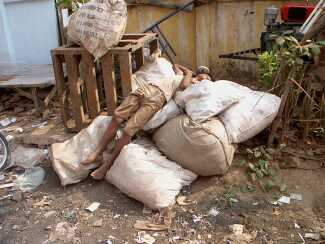 When I went to a wedding at 6:30 AM one recent Sunday morning, this boy was sleeping on top of bags of waste paper he had collected the day before. One of Phnom Penh's many street children, he scavenges for food and a little money and sleeps wherever he is at night. The street children are big social problem here. Going along the city streets at dawn, they can be found sleeping in doorways or wherever they can find a "comfortable" place, like this boy. Some of them spend the rest of the day looking for food or trying to earn a little money by collecting trash or just sniffing glue. Almost none of them have a chance to go to school. Several NGOs have projects to work with these children.
When I went to a wedding at 6:30 AM one recent Sunday morning, this boy was sleeping on top of bags of waste paper he had collected the day before. One of Phnom Penh's many street children, he scavenges for food and a little money and sleeps wherever he is at night. The street children are big social problem here. Going along the city streets at dawn, they can be found sleeping in doorways or wherever they can find a "comfortable" place, like this boy. Some of them spend the rest of the day looking for food or trying to earn a little money by collecting trash or just sniffing glue. Almost none of them have a chance to go to school. Several NGOs have projects to work with these children.
14 March 2002 Chea Sophara, the governor (mayor) of Phnom Penh, has outlawed the sale and public possession of water guns again this year in advance of the Khmer New Year, celebrated April 14-16. Basically he says that they are a danger to society as youths squirt at passing motorbikes and cause traffic accidents. The government also expresses a fear that they will be filled with sewage or with acid in order to carry out the fairly common revenge attacks here. One newspaper account reported that the governor had said that guns were not a part of Khmer culture and so should be banned. This in a country awash with weapons after 30+ years of war, and where an AK-47 sells for $20 on the black market.
6 March 2002
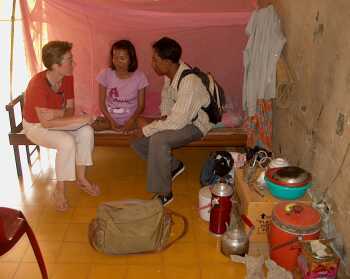 Going to the hospital is not normally a pleasant experience in any culture. In Cambodia you take your life in your hands when you become a patient. That's almost literally true since there are no nurses or other staff in the hospital, only a few doctors who are rarely seen and who as a normal practice will never touch a patient. The TB ward of the "Russian" hospital (built in the glory days of the Soviet Union and never maintained since) is an especially bad place. Here Dr. Helené Morhan, a French doctor working for Maryknoll, checks on a woman patient while another Maryknoll field worker, also a medic, observes. Note the woman's pots and pans for cooking in her room along the wall. The hospital has no food service or even a pharmacy to provide drugs a doctor will prescribe. This patient also has her own mosquito net although she doesn't have an electric fan which most patients bring to keep the mosquitoes away.
Going to the hospital is not normally a pleasant experience in any culture. In Cambodia you take your life in your hands when you become a patient. That's almost literally true since there are no nurses or other staff in the hospital, only a few doctors who are rarely seen and who as a normal practice will never touch a patient. The TB ward of the "Russian" hospital (built in the glory days of the Soviet Union and never maintained since) is an especially bad place. Here Dr. Helené Morhan, a French doctor working for Maryknoll, checks on a woman patient while another Maryknoll field worker, also a medic, observes. Note the woman's pots and pans for cooking in her room along the wall. The hospital has no food service or even a pharmacy to provide drugs a doctor will prescribe. This patient also has her own mosquito net although she doesn't have an electric fan which most patients bring to keep the mosquitoes away.
27 February 2002
Very few of the police in Cambodia have guns. Probably even the government realizes that they are so poorly trained and so corrupt that is too dangerous to arm them. Some units do have sidearms, though, and one day last week as I went by a street corner on the back of a motorbike, I saw a policeman standing by while a street vendor spray painted his .45 pistol black! It was hanging on the vendor's large umbrella. You don't see that too often in the United States. If painting windows causes them to stick shut, I wonder what painting a pistol does?
23 February 2002
There are not a lot of private cars in Cambodia. Most private vehicles are four-wheel drives owned by NGOs or Mercedes owned by government officials and generals. Still you do see the occasional old car that is being fixed up. I was surprised yesterday to see one relatively old car being towed down the street, obviously in the process of some body work. What was surprising, though, was that instead of a tow rope or tow chain, the connecting link between the two vehicles was a piece of green bamboo!
4 January 2002
Officially we are in the "cool" season now (as opposed to the "hot" and "rainy" seasons--we only have three), and--wonder of wonders--it has actually been less hot the last four or five days. It wouldn't be cool by my standards--it's never been below 79 degrees in my room, but it's sure a pleasant change from the more usual high 80s or low 90s that are common at this time of the year. I'll take it!
 As Calvin (of Calvin and Hobbes) is asking for a shoulder-fired thermonuclear missile, and as kids around the western world are adding the latest DVDs and electronic gadgets to their Christmas lists and e-mailing them to Santa Claus, it is worth noting the hottest new toy to appear on the Cambodian kid scene. This innovation is a two-wheeled "car" made from a plastic water bottle with a cutout for the passenger compartment. The wheels are handmade from a piece of particle board. The axle is a little barbecue stick from a type of snack food sold from carts on the street. The kids add a piece of black thread and then merrily pull their creations up and down the dirt streets near the Maryknoll house.
As Calvin (of Calvin and Hobbes) is asking for a shoulder-fired thermonuclear missile, and as kids around the western world are adding the latest DVDs and electronic gadgets to their Christmas lists and e-mailing them to Santa Claus, it is worth noting the hottest new toy to appear on the Cambodian kid scene. This innovation is a two-wheeled "car" made from a plastic water bottle with a cutout for the passenger compartment. The wheels are handmade from a piece of particle board. The axle is a little barbecue stick from a type of snack food sold from carts on the street. The kids add a piece of black thread and then merrily pull their creations up and down the dirt streets near the Maryknoll house.
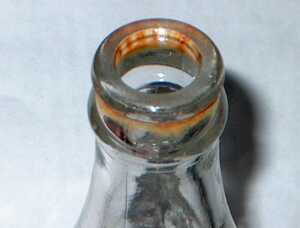 Cambodia doesn't work by quite the same standards of hygiene that the US and most Western countries observe. Often when we open up a Coke bottle, the neck and the lip under the cap are full of rust. I don't know if the bottles never get clean or if the rust develops after the bottle is capped, but it does make one careful about drinking from only the very top of the bottle! Another interesting question is how the caps of Cokes and Sprites get so beat up! The bottle caps look like they've been reused, they are so full of faded paint and scratches, but they are not bent so they're probably being used for the first time. (I certainly hope so!)
Cambodia doesn't work by quite the same standards of hygiene that the US and most Western countries observe. Often when we open up a Coke bottle, the neck and the lip under the cap are full of rust. I don't know if the bottles never get clean or if the rust develops after the bottle is capped, but it does make one careful about drinking from only the very top of the bottle! Another interesting question is how the caps of Cokes and Sprites get so beat up! The bottle caps look like they've been reused, they are so full of faded paint and scratches, but they are not bent so they're probably being used for the first time. (I certainly hope so!)
